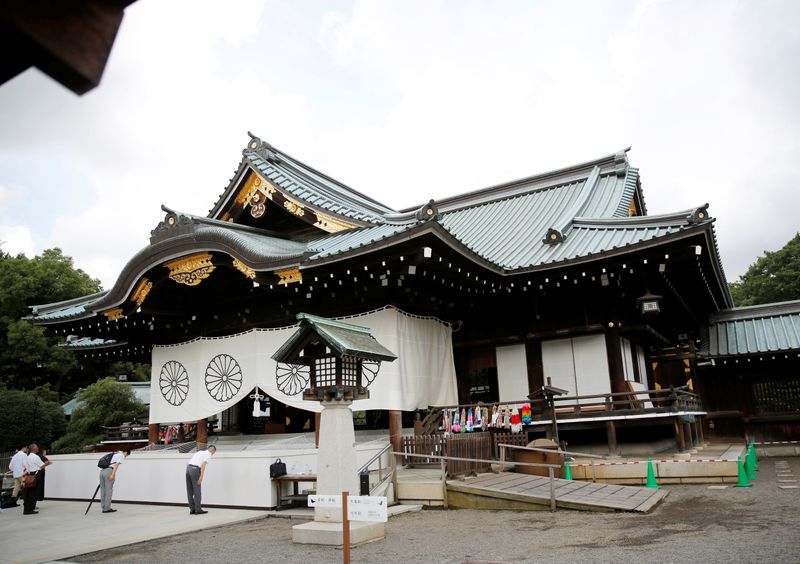TOKYO (Reuters) -Nearly eight decades after Japan's defeat in World War Two, Tokyo's Yasukuni shrine remains a potent symbol of its wartime legacy in East Asia and a flashpoint for regional tension.
Here is some background on the shrine for Japan's war dead and its impact on the country's relations with China and both North and South Korea.
DYING FOR THE EMPEROR
Established in 1869 in a leafy urban enclave, the shrine is dedicated to 2.5 million Japanese who died in wars beginning in the 19th century and including World War Two.
Funded by the government until 1945, Yasukuni - its name formed by combining the words for "peace" and "country" - was central to the state religion of Shintoism that mobilised the wartime population to fight in the name of a divine emperor.
Since 1978 those honoured have included 14 World War Two leaders convicted as "Class A" war criminals by an Allied tribunal in 1948, among them the wartime prime minister, Hideki Tojo.
Tojo and the others were secretly elevated to the status of gods at the shrine in a ceremony that year, news of which sparked a domestic firestorm when it became public.
BITTER MEMORIES
Many Japanese pay respects to relatives at Yasukuni and conservatives say leaders should be able to commemorate the war dead. Chinese and Koreans, however, resent the honours accorded to the war criminals.
Koreans still chafe over Japanese rule from 1910 to 1945, while Chinese have bitter memories of Japan's invasion and brutal occupation of parts of China from 1931 to 1945.
Critics in Japan see Yasukuni as a symbol of a militarist past and say leaders' visits violate the separation of religion and state mandated by the post-war constitution.
A museum on the shrine's grounds has been criticised as depicting the war as one fought by Japan to liberate Asia from Western imperialism, while ignoring atrocities by Japanese troops.
The names of thousands of men from Taiwan and Korea killed while serving with imperial forces are also recorded at Yasukuni. Some relatives want their names removed.
AVOIDED BY EMPERORS
Emperor Hirohito, in whose name Japanese soldiers fought the war, visited Yasukuni eight times between the conflict's end and 1975. Historians say he stopped due to displeasure over the enshrined convicted wartime leaders.
His son, Akihito, who became emperor in 1989 and abdicated in 2019, never visited, nor has current Emperor Naruhito.
PRIME MINISTERS' CONTROVERSY
Many Japanese premiers visited Yasukuni after the war, but refrained from saying it was in an official capacity. Yasuhiro Nakasone made an official visit in 1985 on the 40th anniversary of the war's end, drawing harsh criticism from China. He did not go again.
Junichiro Koizumi made annual visits while premier from 2001 to 2006, straining ties with China.
Shinzo Abe, whose agenda included reviving pride in Japan's past, visited in December 2013, saying he went to pray for the souls of the war dead and "renew the pledge that Japan must never wage a war again".
His visit sparked outrage in Beijing and Seoul and an expression of "disappointment" from the United States. Abe did not go again as prime minister, sending ritual offerings instead.
Prime Minister Yoshihide Suga has not visited the shrine since taking office in September last year. In October, he sent an offering to coincide with the shrine's autumn festival, prompting a statement of "deep regret" from the South Korean government.
ANOTHER WAY?

One proposal is to expand the nearby Chidorigafuchi National Cemetery, dedicated to unidentified war dead, into an alternative memorial site. A 2002 panel called for a state-run, secular facility for war dead. Neither idea gained traction.
Others have suggested dropping the Class-A war criminals from the list of those honoured, but shrine officials say that is impossible.